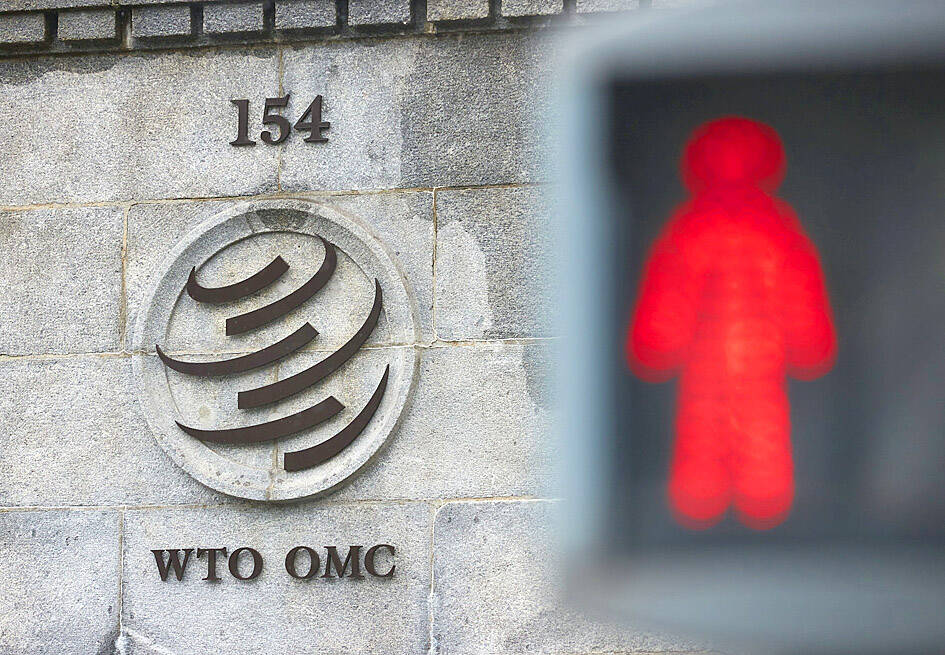Taiwan respects the EU’s decision last week to suspend its dispute against China at the WTO, a senior diplomat said yesterday, adding that Taipei still condemns Beijing for the trade embargo that triggered the case.
Eric Huang (黃鈞耀), director-general of the Ministry of Foreign Affairs’ Department of European Affairs, said that the government respected the EU’s decision to suspend the case involving a de facto trade embargo China initiated against Lithuania over it developing closer ties with Taiwan.
Nevertheless, the government continues to condemn Beijing over its “illegal economic sanctions” targeting Vilnius, Huang said.

Photo: Reuters
“We continue to express our support for Lithuania as well as the rules-based international economic and trade order,” he said in Taipei.
Huang delivered his criticism after he was asked to comment on a note circulated by the Geneva-based WTO on Friday saying that the EU had requested to “immediately suspend its proceedings” with China.
“This is a procedural step taken for technical reasons related to the need to assess certain elements arising from the preparation of written submissions,” European Commission spokesperson Olof Gill said on Saturday.
The panel is suspended “for the time being,” he said.
Brussels formally launched its WTO dispute in early 2022 after Beijing imposed trade restrictions against Lithuania in late 2021 because Vilnius deepened its ties with Taiwan.
China was particularly angry that Lithuania allowed Taiwan to use the name “Taiwan” on its representative trade office in Vilnius, an unprecedented departure from previous practice of using “Taipei.”
The case also dealt a blow to relations between Beijing and Brussels, with the EU accusing China of discrimination and coercion against member Lithuania.
Taiwan, as an official member of the WTO, also participated in the EU-China WTO case proceedings, during which Taipei expressed its support for Lithuania and the rules-based world order, Huang said.
Although the case has been suspended, the dispute motivated Brussels to boost its own trade arsenal, he said.
One of the tools it deployed was an anti-coercion instrument, which effectively allows the European Commission to investigate whether economic coercion has occurred against an EU country and to propose countermeasures, he said.
Relations between Taiwan and Lithuania have warmed since 2021, with the two sides signing an agreement in July of that year to open reciprocal representative offices.
Taiwan opened its office in Vilnius on Nov. 18, 2021, with Huang serving as Taiwan’s first representative to Lithuania until earlier this month.
The Baltic state came under heavy political and economic pressure from Beijing following its decision to let Taiwan’s office in Vilnius include the word “Taiwanese” in its English name and “Taiwan” in its Chinese name.
In response, China recalled its ambassador to Lithuania and expelled Vilnius’ envoy in Beijing, while also suspending direct freight rail services and some Lithuanian imports.
Taiwan typically names its overseas representative offices “Taipei Economic and Cultural Office” or “Taipei Representative Office,” in keeping with the host countries’ preference to avoid any references that imply it is separate from China.
Beijing has sought to impose a political cost on Lithuania for its decision to allow the inclusion of “Taiwanese” in the name.

US President Donald Trump said "it’s up to" Chinese President Xi Jinping (習近平) what China does on Taiwan, but that he would be "very unhappy" with a change in the "status quo," the New York Times said in an interview published yesterday. Xi "considers it to be a part of China, and that’s up to him what he’s going to be doing," Trump told the newspaper on Wednesday. "But I’ve expressed to him that I would be very unhappy if he did that, and I don’t think he’ll do that," he added. "I hope he doesn’t do that." Trump made the comments in

Tourism in Kenting fell to a historic low for the second consecutive year last year, impacting hotels and other local businesses that rely on a steady stream of domestic tourists, the latest data showed. A total of 2.139 million tourists visited Kenting last year, down slightly from 2.14 million in 2024, the data showed. The number of tourists who visited the national park on the Hengchun Peninsula peaked in 2015 at 8.37 million people. That number has been below 2.2 million for two years, although there was a spike in October last year due to multiple long weekends. The occupancy rate for hotels

Japanese footwear brand Onitsuka Tiger today issued a public apology and said it has suspended an employee amid allegations that the staff member discriminated against a Vietnamese customer at its Taipei 101 store. Posting on the social media platform Threads yesterday, a user said that an employee at the store said that “those shoes are very expensive” when her friend, who is a migrant worker from Vietnam, asked for assistance. The employee then ignored her until she asked again, to which she replied: "We don't have a size 37." The post had amassed nearly 26,000 likes and 916 comments as of this

A cold surge advisory was today issued for 18 cities and counties across Taiwan, with temperatures of below 10°C forecast during the day and into tonight, the Central Weather Administration (CWA) said. New Taipei City, Taipei, Taoyuan and Hsinchu, Miaoli and Yilan counties are expected to experience sustained temperatures of 10°C or lower, the CWA said. Temperatures are likely to temporarily drop below 10°C in most other areas, except Taitung, Pingtung, Penghu and Lienchiang (Matsu) counties, CWA data showed. The cold weather is being caused by a strong continental cold air mass, combined with radiative cooling, a process in which heat escapes from